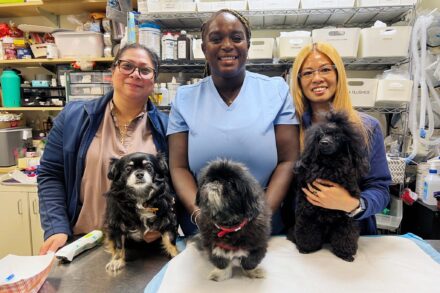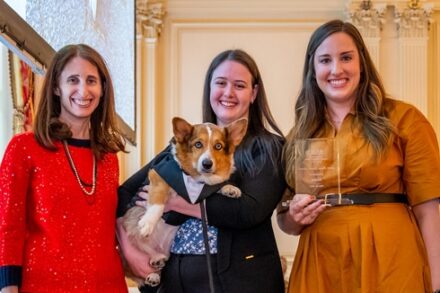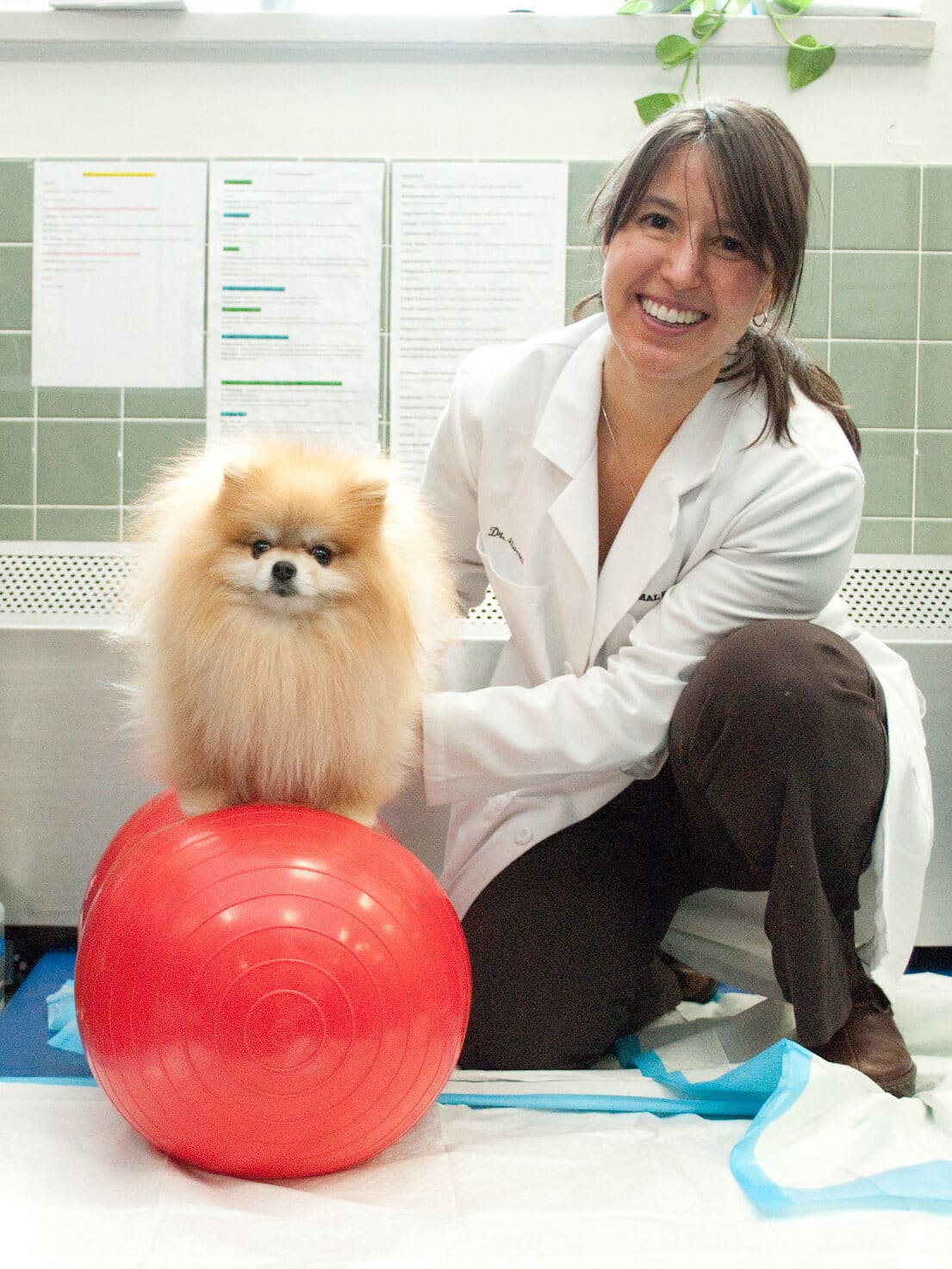AMC Research Spotlight Archive
On this page…
- Research Spotlight | Dr. Leilani Alvarez’s Research Among Veterinary Surgery’s Most Read Articles
- Research Spotlight | AMC Veterinarians are Key Contributors to Landmark Internal Medicine Textbook
- Research Spotlight | How a Chance Encounter Led to Research Success: Highlighting the Work of Dr. Taryn Donovan
Dr. Leilani Alvarez’s Research Among Veterinary Surgery’s Most Read Articles
One measure of a publication’s impact is how often the article is read. Recently, AMC’s Dr. Leilani Alvarez received a special recognition from Veterinary Surgery, the official journal of the American College of Veterinary Surgeons, when her article, Systematic review of postoperative rehabilitation interventions after cranial cruciate ligament surgery in dogs, ranked in the top 10% of papers published in the journal in 2022 based on downloads.
The popularity of Dr. Alvarez’s research is due in part to the prevalence of cranial cruciate ligament disease, which is the leading cause of hindlimb lameness and arthritis of the canine knee. Dogs with one torn cruciate ligament frequently develop a tear in the other leg. While surgeons repair the ligament using a variety of techniques, postoperative rehabilitation therapy helps return the knee to normal function. Dr. Alvarez’s study determined therapeutic exercise and cold compression therapy to be the most useful modalities available.
Congratulations to Dr. Alvarez on this achievement!
AMC Veterinarians are Key Contributors to Landmark Internal Medicine Textbook

The ninth edition of Ettinger’s Textbook of Veterinary Internal Medicine (TVIM) was just released. This textbook is a veterinarian’s trusted resource and is considered the “bible” for internal medicine specialists. The book is extra special to AMC because the eponymous title belongs to none other than a member of AMC’s first intern class, Dr. Stephen Ettinger!
No single person could author such an imposing book. This tome comes off the shelf at an imposing 2,448 pages co-authored by dozens of veterinary experts worldwide. The book’s two volumes are divided into sections covering major topics such as heart disease, kidney disease and liver disease. Of the 22 sections within the TVIM, three current AMC Senior Veterinarians — Drs. Allyson Berent, Ann Hohenhaus and Chick Weisse — served as editors for sections entitled “Minimally Invasive Interventional Therapies,” “Hematologic and Immunologic Disease” and “Lower Urinary Tract Disease,” respectively. A fourth section editor is an AMC alumnus.
Each of the 22 sections is further divided into chapters focusing on a specific disorder, such as different types of cancer, Addison’s disease or hypoadrenocorticism and seizures. In total, the two volumes contain 331 chapters, and ten of those chapters were authored by AMC Senior Veterinarians including:
An additional 16 chapters were authored by AMC alumni, giving AMC a strong presence in this authoritative new edition.
How a Chance Encounter Led to Research Success: Highlighting the Work of Dr. Taryn Donovan
Over the past 4 years, Dr. Donovan has been a prolific contributor to new research in veterinary medicine, serving as senior author or co-author on 18 manuscripts in her specialty of veterinary pathology. This very productive stretch started with a chance encounter at the annual meeting of the American College of Veterinary Pathologists. A colleague, not from AMC, had misspelled the name of a legendary AMC pathologist, Dr. Amiya Patnaik in a presentation, and when Dr. Donovan brought this error to the colleague’s attention, the ensuing conversation led to a research collaboration and a published article: “Mitotic Figures-Normal, Atypical, and Imposters: A Guide to Identification.”
Dr. Donovan’s unique expertise in identifying mitotic figures (cells in the process of dividing, commonly seen on cancer biopsies) also led to frequent collaborations with Dr. Christoph Bertram of the University of Veterinary Medicine in Vienna, Austria. Dr. Bertram’s research interests include applications of artificial intelligence in biopsy analysis, and one of their early collaborations was a paper titled “Computer-assisted mitotic count using a deep learning-based algorithm improves interobserver reproducibility and accuracy,” which showed the AI-guided algorithm was more accurate and reliable than human pathologists in assessing dividing cells in a biopsy.
Her work in cancer biopsy interpretation has also led to her participation in the standardizing of tumor biopsy evaluation and reporting and a recent call to action for the veterinary oncology community to adopt common guidelines to improve patient care worldwide.
Back to top
































